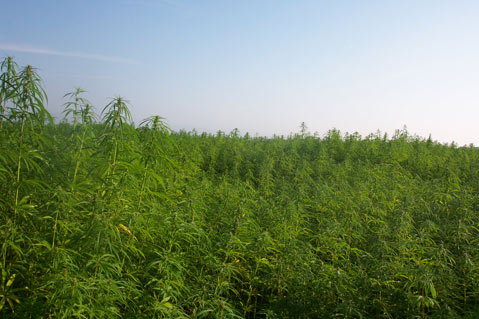Made in the U.S.A.
An Idea for Growing the Economy That Is More Environmentally Friendly Than Oil Production

We all agree that we need to generate tax dollars and pump money into the economy. Here is an idea as old as America itself. It should strongly appeal to local agricultural interests, those who wish to promote economic growth, and people who support made-in-America products. It follows the logic of a recent News-Press editorial urging increased local oil production. The very conservative writer felt that we should look to the resources available right here in Santa Barbara County for increased tax and private-profit dollars. My suggestion is much less controversial and more environmentally friendly than increasing oil production — grow hemp.
If hemp were grown here we would join the roughly 35 countries in the world where it is legal to grow hemp. Sixteen of these United States have legalized the growing of hemp. A North Dakota rancher, who is also a Republican state legislator there, has sued the federal government to allow him to grow hemp pursuant to North Dakota’s hemp law. He has been quoted as saying that it makes no sense to him that Canadian ranchers less than 50 miles from his ranch, just over the Canadian/U.S. border, are growing hemp and profiting from it, while he can’t.

There are compelling economic reasons for legalizing it. Hemp can be one of the pillars for lifting us out of our current economic doldrums. That hemp is commercially viable is no secret. In the late 1930s, Henry Ford built nearly an entire car from hemp. In WWII, hemp was so vital to the war effort that if you were a farmer who grew hemp, neither you nor your sons could be drafted. Over 25,000 products can be made from hemp. For those who care, you can’t get high from hemp because it contains very low levels of the euphoriant THC and high levels of the antieuphoriant CBD.
Hemp has played a key role in American history. The British navy was so reliant on hemp that hemp was legally required to be grown in almost all of the American colonies. For 1,000 years, until the 1880s, hemp was the most profitable ag crop in the world. In 1916, the U.S. Department of Agriculture, because of a new modern harvesting device, encouraged farmers to once again grow hemp as a profitable plant. In 1938, Popular Mechanics ran an article entitled “Hemp the New Billion Dollar Crop.” And that was when a billion dollars was a lot of money.
Historians are well aware that the passage of Marijuana Tax Act had nothing to do with marijuana and everything to do with hemp. This is one of many reasons why the American Medical Association opposed the Marijuana Tax Act. The AMA testified that cannabis had medicinal use (cannabis was in the United States Pharmacopeia from 1854 until 1941) and that the “AMA knows of no dangers from medicinal cannabis.” More telling, the AMA had contacted the Bureau of Prisons, Childrens Bureau, Education Department, U.S. Public Health Service Pharmacy Division, plus at least two or three other federal agencies; not one of them had one iota of evidence that cannabis was harmful and no government official or any person even testified at those hearings to any harms from hemp. Yet somehow it is illegal to grow hemp.
No, it wasn’t marijuana (or cannabis as the AMA insisted this product should be called), it was Lamont Dupont and the Dupont Corporation whom historians generally finger as being the prime mover behind making marijuana illegal. Why, you ask? This is because Dupont feared the competition hemp, with new, cheaper ways of harvesting and preparing for industrial use, would bring to Dupont’s major products – nylon, rayon, tetraethyl lead, cellophane, and sulfide for paper-making. Dupont was also a major shareholder in General Motors and Ford’s biofuel-powered hemp car was a threat to their automobile empire. Why, they might have to change their engines to run on biofuel, or this new Ford might appeal to some of GM’s customers and beef up Ford as a competitor.
This is a no-brainer. It’s time to stop out-sourcing products that can be made in the U.S.A. Let’s grow and tax hemp in California. Hemp production will help agricultural interests, create jobs, and increase our tax base.



